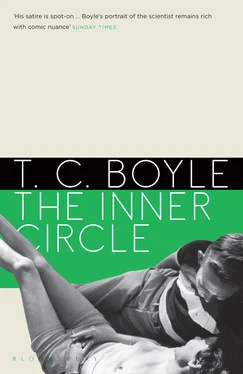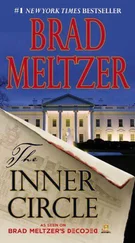I remember one candidate by the name of Birdbright. He was forty-five, happily married, father of a well-adjusted and grown daughter, just decommissioned from the Navy and in the process of submitting his doctoral thesis at Harvard in the field of Physical Anthropology. He came to campus and Prok quizzed him late into the night. Corcoran and I took him on the rounds of the taverns, and though he seemed a bit stiff — his military bearing, I suppose, or perhaps it was just academic rigor — we could find nothing to disqualify him. He was a scotch man, smoked Camels, hated sports. He wasn’t particularly easy to draw out in conversation, but he wasn’t sex shy either and seemed to have few biases against any number of sexual behaviors that were, technically speaking, against the law. The day after his visit the three of us sat down to compare notes. “I find nothing objectionable in the man,” Prok said, the candidate’s file spread open on the desk before him, and Corcoran and I had to agree. There was a pause. “Yet I don’t sense any real enthusiasm either.” Prok gently closed the folder and let his eyes roll back in his head. “But Birdbright —is anybody going to want to disclose sensitive information to a man with a name like that?” He let out a short, chiming laugh. “ Birdbright, really!”
There was another man disqualified along similar lines. Again, he was unobjectionable, if not particularly exciting, and he did have an acceptable wife and the proper academic background, but he was burdened with a long, hyphenated name — Theodore Lavushkin-Esterhazy — that set Prok to fretting. Prok put it to him directly: Would he consider shortening his name to the less imposing Theodore Esterhazy, or even, for the purposes of interviewing lower-level subjects, simply Ted Ester-hazy? The candidate replied that his was a venerable family name of several centuries’ standing and that under no condition would he consider editing it. That was the term he used, “editing.” Prok tented his hands on the desk before him, gave the candidate a long tunneled look, and thanked him for his time.
Yes. And there was one other man rejected because of his wife, who had a drinking problem, as we learned through inquiries among the staff at his previous place of employ and discovered firsthand at a Bryan Park picnic held in his honor. The wife was loud, sexually showy, with muscular calves and protuberant breasts, and she hung on one man after another, quaffing Planter’s Punch as if it were carrot juice. She didn’t create a scene, not exactly, but it was enough to warn us off. Prok had no use for drunks because drunks were unreliable and couldn’t be trusted to keep their mouths shut (and he was to lecture me about my own alcohol consumption on more than one occasion, but that’s not relevant here, or at least not at this juncture). This is not to say, incidentally, that he was ruthless, as the rumormongers might have you believe, nor that he chose the members of his team based on his ability to control and dominate them, but only that he was preternaturally sensitive to the needs of the project. There were secrets to keep. There was work to be done. Who could blame him for being particular?
Rutledge, of course, as the whole world knows, was the man we finally settled on. We all liked him from the start. Despite his Ivy League credentials and a sheaf of laudatory letters from some of the biggest names in the field, Robert M. Yerkes among them, he seemed down to earth, equally at ease with President Wells and Prok’s colleagues in the Zoology Department as he was with the waiter who brought us our chops at Murchison’s or the barman who mixed us highballs at the tavern, and from the start he treated Corcoran and me as his colleagues and equals. His wife, Hilda, was a tall asthenic blonde who talked out of the corner of her mouth as if everything she said was a wisecrack — and more often than not it was. She was relaxed and informal, a breath of fresh air after the wives of the majority of the other candidates, who might as well have been auditioning for a part in one of those robot pictures that seem to be infesting the theaters these days. Another plus, to my mind, at least: she took to Iris right off. Prok arranged for us all to have drinks with the Rutledges one afternoon — the Corcorans, the Milks and the Kinseys — and before Prok had even handed me my first Zombie cocktail, she and Iris had their heads together. And the children, never forget the children, because as Prok says they’re perhaps the best reflection of the parents, in this case two solemn boys of eight and nine, who seemed well-adjusted and polite enough.
After the preliminary round of interviews, Rutledge was the sole candidate we invited back for a follow-up, and if he passed muster this time, it was understood that Prok was prepared to offer him the job. I met him at the bus station and together we walked up to the Institute. It was autumn — the autumn of ’46 now, and I remember distinctly for reasons that will soon become apparent — and the day was unseasonably warm, a taste of Indian summer before the cold weather set in and the leaves turned and the Northern Hemisphere tilted away from the sun for yet another long season of contrition. Rutledge was wearing a tweed jacket over a long-sleeved shirt, he’d pushed his hat back to get a little air on his brow and loosened his tie so that it canted away from his open collar like a lolling tongue. He had a briefcase in one hand and a traveling bag in the other, his raincoat thrown carelessly over his shoulder. I asked if I could give him a hand with anything, and he broke into a smile. “Sure, John,” he said, “that would be kind of you,” and passed me the traveling bag.
We walked on in silence a moment. The sidewalks had been dampened by a fleeting rain, and every yard we passed seemed well tended and tranquil, with picket fences, overspilling flowerbeds and glistening lawns. Butterflies drifted over the blooms, birds soliloquized in the trees. “You know, I really do like this town,” he said. “It has character. And charm too. It’s not quite Princeton, maybe, but it’s got plenty to offer as far as I can see. What do you think? You like it here?”
“Well, yes,” I said, “sure. It’s quiet, of course, but we make our own society.”
“With Dr. Kinsey?”
We were stopped at a corner, waiting for a bus to move off across the intersection. I was conscious of Rutledge’s eyes on me. He was sounding me out, and that was all right with me — it wasn’t as if he were asking me to reveal anything he didn’t already know. It just meant that he was confident Prok would offer him the job — and further, that he was leaning toward taking it. “Prok’s a big part of it,” I admitted.
“You’re very close, aren’t you?”
“Yes,” I said, “we are.”
He let that rest a moment and then the bus moved on and we crossed the street. His gait was easy, the briefcase swinging, tie stirring in the breeze our progress generated, and we fell into step, in rhythm, and I felt a kind of communion with him then, as if we were two athletes moving across the field of play. “You were his student, weren’t you?”
I told him that I was, or had been, and then I laughed. “But I guess you’d have to say I still am, because with Prok the learning process goes on every minute of every day.”
“He certainly has energy, Prok,” Rutledge said.
“Yes, he does. I’ve never met anyone like him.”
“But I like that. I like the whole project, what you and he and Purvis are doing here. It’s very exciting. Groundbreaking, really.”
We were striding right along, a block from the university now. It felt good to be out of the office and under the sun, if only for half an hour, and I was glad Prok had appointed me to be the one to go to the station. I didn’t get out enough. None of us did. I made a mental note to see if Iris might not like to go for a picnic over the weekend before the weather turned.
Читать дальше












